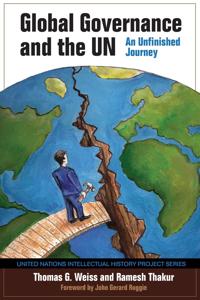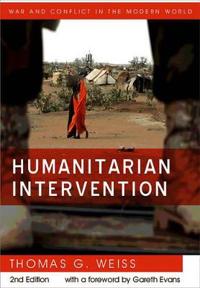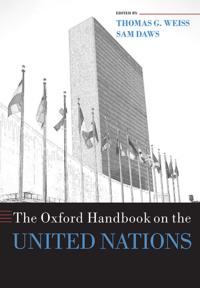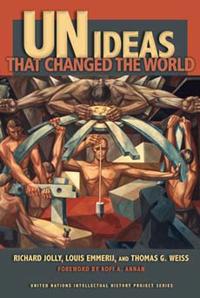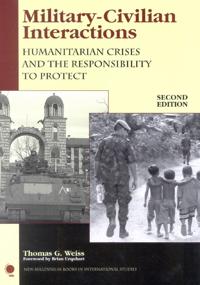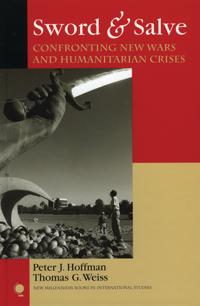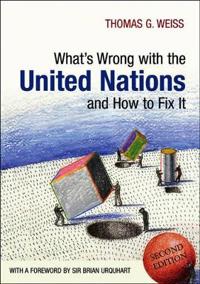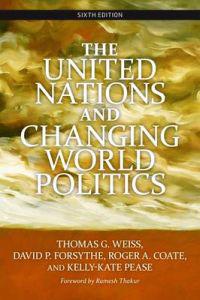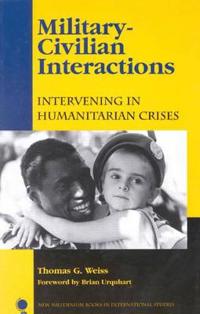Global Governance and the UN (Häftad)
avThomas Weiss, Ramesh Thakur
ISBN: 9780253221674 - UTGIVEN: 201004In the 21st century, the world is confronted by threats of global scale that cannot be tackled without collective action. Although global government as such does not exist, formal and informal institutions, practices, and initiatives--together forming "global governance"--bring a greater measure of [...]
Humanitarian Intervention, 2nd Edition (Häftad)
avThomas Weiss
ISBN: 9780745659800 - UTGIVEN: 2012-03-31Humanitarian Intervention (Häftad)
avThomas Weiss, Gareth Evans
ISBN: 9780745659817 - UTGIVEN: 201204A singular development of the post Cold-War era is the use of military force to protect human beings. From Rwanda to Kosovo, Sierra Leone to East Timor, and more recently Libya to Cote d'Ivoire, soldiers have rescued some civilians in some of the world's most notorious war zones. Could more be saved[...]
The Oxford Handbook on the United Nations (Häftad)
avThomas G. Weiss, Sam Daws
ISBN: 9780199560103 - UTGIVEN: 200811This is an authoritative, one-volume, and independent treatment of the UN's sixty-year history written by distinguished scholars, analysts, and practitioners. Citations and suggested readings contain a wealth of primary and secondary references to the history, politics, and law of the world organiza[...]
UN Ideas That Changed the World (Pocket)
avRichard Jolly, Louis Emmerij, Thomas G. Weiss
ISBN: 9780253221186 - UTGIVEN: 2009-08Ideas and concepts have been a driving force in human progress, and they may be the most important legacy of the United Nations. UN ideas have set past, present, and future international agendas in many global economic and social arenas and have also led to initiatives and actions that have improved[...]
Humanitarianism Contested (Pocket)
avMichael Barnett, Thomas G. Weiss
ISBN: 9780415496643 - UTGIVEN: 2011-02-18Thinking About Global Governance (Pocket)
avThomas G. Weiss
ISBN: 9780415781930 - UTGIVEN: 2011-08-01What is the current state of thinking about global governance? Can the United Nations be reformed and modernized? Is it legal, ethical or desirable for states to invade other states in the name of humanitarian intervention? Thomas G. Weiss has been contemplating these significant issues throughout t[...]
Maritime Piracy (Inbunden)
avRobert Haywood, Roberta Spivak, Thomas G. (FRW) Weiss
ISBN: 9780415781978 - UTGIVEN: 2012-04Maritime Piracy is now a pressing global issue, and this work seeks to provide a concise and informative introduction to the area. Never truly having receded into a romanticized past, seaborne banditry's rapid growth was stimulated by low risks and increasingly high rewards. Currently, obsolete, inc[...]
Military-Civilian Interactions (Häftad)
avThomas G. Weiss
ISBN: 9780742530171 - UTGIVEN: 200410Is it possible and worthwhile to use the military in conjunction with humanitarian action to thwart violence and mitigate civilian suffering? This timely book seeks to answer this question by looking at the contemporary context and history of military-civilian interactions, developing a framework fo[...]
Sword and Salve (Häftad)
avPeter J. Hoffman, Thomas G. Weiss
ISBN: 9780742539785 - UTGIVEN: 200603Arguing forcefully that changing times are a clarion call for new thinking, this book convincingly shows that if humanitarian organizations continue to operate as they have in the past, they will fail to help the very victims whom they try to save. Focusing especially on the emergence of 'new wars,'[...]
What s Wrong with the United Nations and How to Fix it (Häftad)
avThomas G. Weiss
ISBN: 9780745659824 - UTGIVEN: 2012-04-30What's Wrong with the United Nations and How to Fix It (Pocket)
avThomas G. Weiss
ISBN: 9780745659831 - UTGIVEN: 201206Six decades after its establishment, the United Nations and its system of related agencies and programs are perpetually in crisis. While the twentieth-century's world wars gave rise to ground-breaking efforts at international organization in 1919 and 1945, today's UN is ill-equipped to deal with con[...]
Global Governance: Why? What? Whither? (Häftad)
avThomas G. Weiss
ISBN: 9780745660455 - UTGIVEN: 2013-05-31Friends and foes of international cooperation puzzle about how to explain order, stability, and predictability in a world without a central authority.[...]
Global Governance: Why? What? Whither? (Häftad)
avThomas G. Weiss
ISBN: 9780745660462 - UTGIVEN: 2013-05-31Friends and foes of international cooperation puzzle about how to explain order, stability, and predictability in a world without a central authority.[...]
Humanitarian Business (Häftad)
avThomas G. Weiss
ISBN: 9780745663319 - UTGIVEN: 2013-03-31With some 50 billion people living under duress and threatened by wars and disasters in 2012, the demand for relief worldwide has reached unprecedented levels. Humanitarianism is now a multi-billion dollar enterprise, and aid agencies are obliged to respond to a range of economic forces in order [...]
Humanitarian Business (Häftad)
avThomas G. Weiss
ISBN: 9780745663326 - UTGIVEN: 2013-03-31With some 50 billion people living under duress and threatened by wars and disasters in 2012, the demand for relief worldwide has reached unprecedented levels. Humanitarianism is now a multi-billion dollar enterprise, and aid agencies are obliged to respond to a range of economic forces in order [...]
The United Nations and Changing World Politics (Häftad)
avThomas G. Weiss, David P. Forsythe, Roger A. Coate
ISBN: 9780813344355 - UTGIVEN: 201002This is a comprehensive examination of the UN which explores its role in international security, human rights and building peace through sustainable development. Built around three critical themes in international relations - international peace and security, human rights and humanitarian affairs, a[...]
Military-civilian Interactions (Häftad)
avThomas G. Weiss
ISBN: 9780847687466 - UTGIVEN: 199812One of the most important dynamics of the postDCold War period consists of simultaneously downsizing the armed forces and assigning them new roles. As a result, military-civilian humanitarianism_the coming together of military forces and civilian agencies to deal with the human suffering from comple[...]
Experiments in General Chemistry (Häftad)
avGerald S. Weiss, Thomas G. Greco, Lyman H. Rickard
ISBN: 9781292039558 - UTGIVEN: 2013-11-01Das Achtsamkeits-Übungsbuch (Inbunden)
avHalko Weiss, Michael E. Harrer, Thomas Dietz
ISBN: 9783608947090 - UTGIVEN: 2014-07

